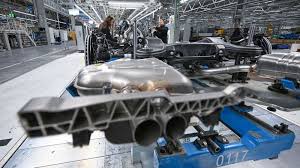Italy, Germany join carmakers in call to rethink internal combustion engine ban

Rome: Rome and Berlin are siding with the European automotive industry in calling for the EU to relax CO2 emissions standards for cars as the bloc aims to end the sale of new petrol and diesel models by 2035.
Italy and Germany are mustering support from other EU members for a call to relax EU targets for reducing car CO2 emissions and reconsider a 2035 ban on the sale of petrol and diesel models, Italian Industry Minister Adolfo Urso said in Brussels Wednesday evening.
It was now “certain” that the ban – actually a zero limit on tailpipe emissions – would not be achieved, and the two countries plan to propose at an EU Council summit Thursday that a review clause in the legislation be brought forward from the end of 2026 to early 2025, Urso said.
Echoing recent warnings from manufacturers, Urso said Europe’s car industry had “collapsed” and predicted “tens of thousands” of redundancies in the sector unless the EU changed course.
The EU had two choices, the Italian minister said: firstly, to keep the target and create the conditions to allow the car industry to achieve it – an approach favoured by German economy minister Robert Habeck. “Or if we fail to do all this we just have to…postpone the objectives,” he said.
Urso’s statements came three months after Prime Minister Giorgia Meloni dismissed the 2035 ban as “ideological madness,” and just days after an appeal from the European Automobile Manufacturers’ Association (ACEA), which reacted to a dip in e-car sales last week by going public with a call to postpone the application of more stringent emissions limits.
The influential Brussels-based group – whose members include BMW, Ford, Renault, Volkswagen and Volvo – warned on 19 August that new car registrations fell below 644,000 in August, a more than 18% drop compared to the same month in 2023. Sales of electric cars saw the largest proportional drop, with market share falling by almost a third from the 21% recorded last year.
“We are missing crucial conditions to reach the necessary boost in production and adoption of zero-emission vehicles: charging and hydrogen refilling infrastructure, as well as a competitive manufacturing environment, affordable green energy, purchase and tax incentives, and a secure supply of raw materials, hydrogen and batteries,” ACEA’s board of directors said.
Currently carmakers must ensure that the emissions of all the cars they sell in a given year average no more than 115.1 grammes per kilometre, and the limit is set to tighten to 93.6g next year – a figure that will be harder to achieve as electric vehicle sales fall in a market increasing dominated by larger SUV models.
Facing what it called the “daunting prospect of … multi-billion-euro fines” next year, ACEA urged the EU to implement “urgent relief measures”. But the European Commission appears to believe the blame for its predicament lies at least partly with the industry itself.
“There’s still 15 months of car sales ahead and the industry has time…to meet their targets,” a Commission spokesperson told reporters on Tuesday. “It is also worth recalling the target for 2025 was agreed in 2019 and…we have designed these policies in a way that the industry has time to adapt.”
Further emissions reduction deadlines adopted last year mean that only cars and vans emitting no CO2 at all can be sold in the EU as of 2035 – a de facto ban on petrol and diesel models.
However, in a last-minute tweak forced by Germany, a clause was inserted calling for a review in 2026 on potentially allowing the continued registration of cars intended to be run on synthetic ‘low-carbon’ fuels – which would amount to a reprieve for the internal combustion engine.
The automotive lobby also wants this review, and a similar one for heavy goods vehicles due a year later, to be brought forward to 2025. Industrial sectors, from generators to battery manufacturers that stand to gain from accelerated electrification of Europe’s energy system are lobbying hard for the EU to stick to its current targets.





